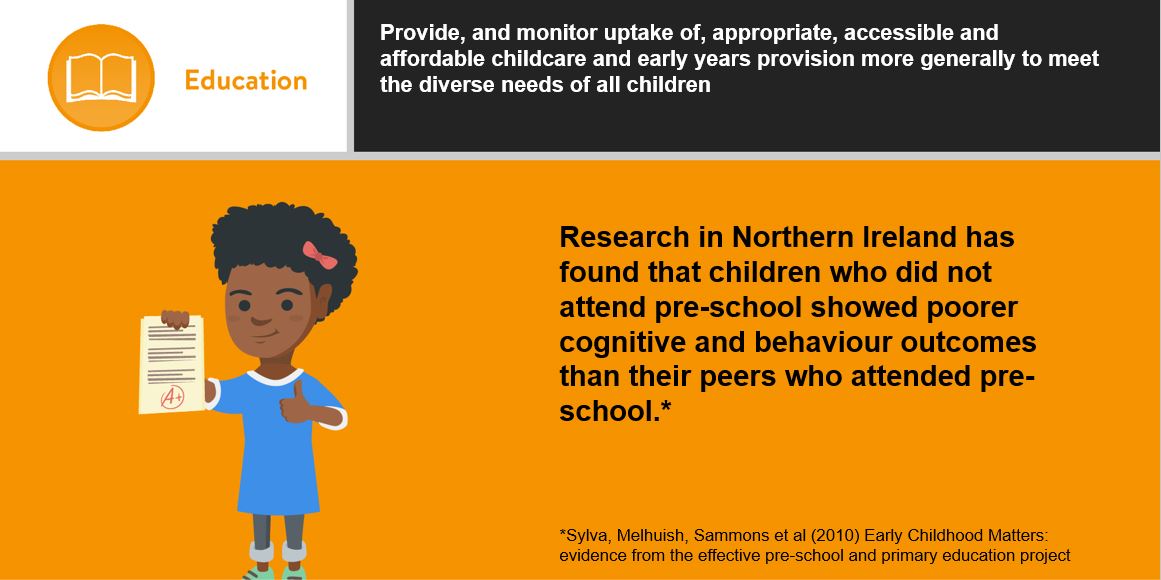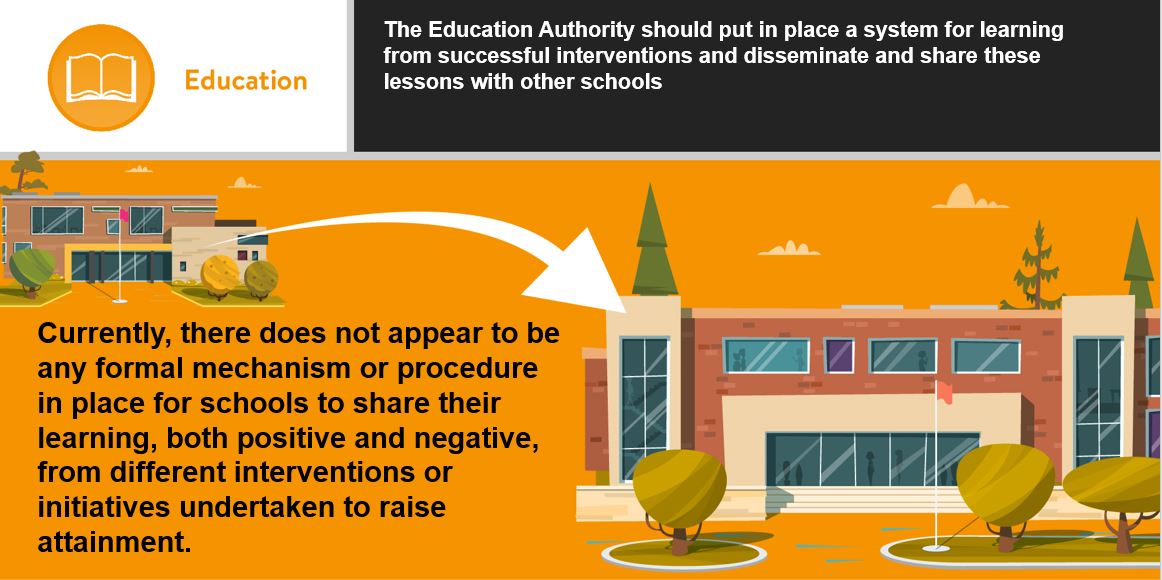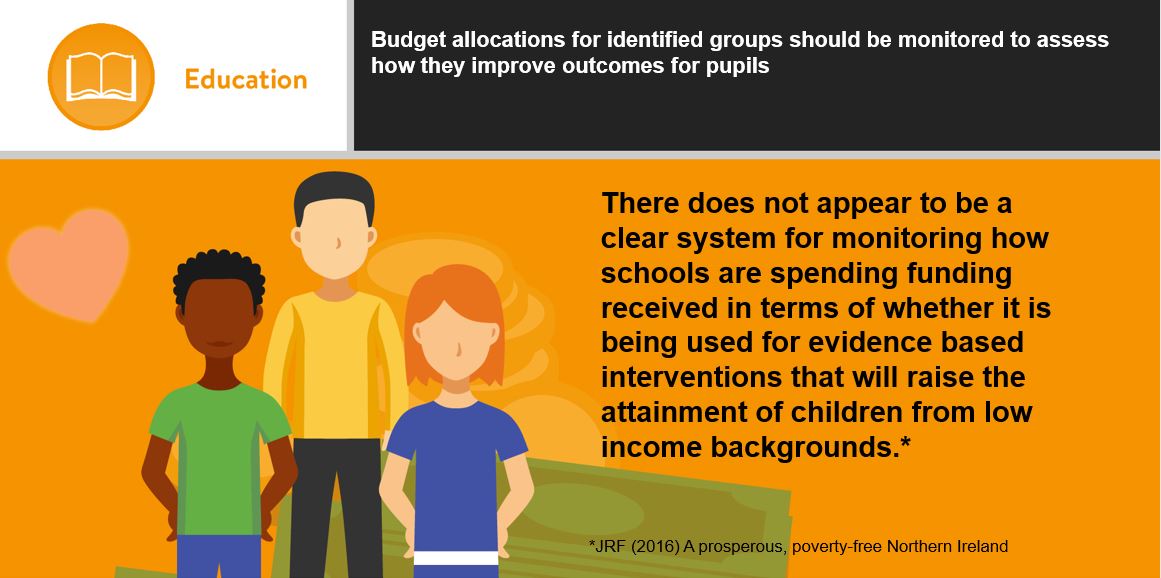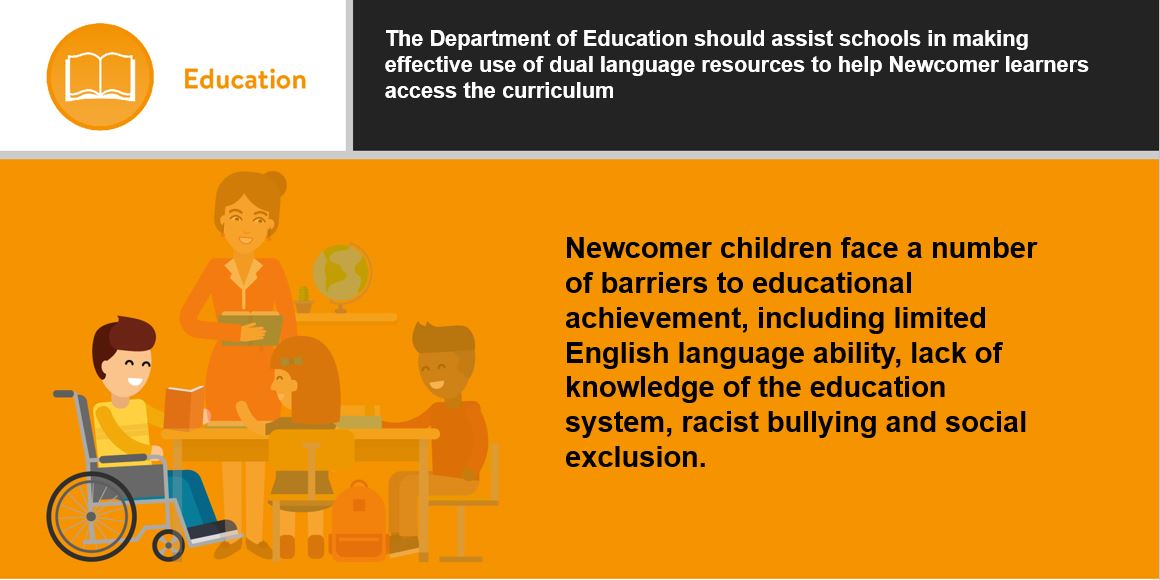See the Equality Commission's policy recommendations: Tackling bullying and challenge stereotypes in education (pdf)
The Department of Education should undertake comprehensive research to establish, and track over time, the prevalence and nature of prejudice-based bullying, and to assess school compliance with the Addressing Bullying in Schools Act.
Records of incidents of prejudice-based bullying, as required by the Addressing Bullying in Schools Act, are currently retained at school level and are not collated or analysed by the Department of Education (DE). In this context, it is essential that data is collected now (at the commencement of the legislation) and thereafter on a rolling basis, potentially via an all-pupil Northern Ireland level survey, to track the prevalence of bullying. The findings must be disaggregated by equality categories. This will allow the Department and wider stakeholder groups, including the Education Authority, management bodies and representative groups, to gauge the effectiveness of current interventions and focus attention on areas of concern. Consideration should also be given as to how best to gather data on the prevalence, nature and any specific impacts of cyber-bullying.
Linked to this is the need to establish levels of compliance by schools and Boards of Governors with their duties under the Addressing Bullying in Schools Act. This would allow analysis of practice generally, and specifically in relation to areas where the legislation is not prescriptive. Schools have discretion within the legislation to collect and monitor one-off incidents of bullying and cyber-bullying. Data could be gathered via qualitative and quantitative surveys in addition to routine Education and Training Inspectorate inspections. This analysis would highlight any inconsistencies across schools and allow training needs to be identified. It would also provide information on the extent to which particular bullying motivations are recorded and may demonstrate a requirement, as permitted under the legislation, for the list of motivations to be amended.
The Department of Education and Education Authority should ensure their guidance on complying with the requirements of the Addressing Bullying in Schools Act, and on responding to and preventing incidents of bullying behaviour, is comprehensively implemented and updated as required.
We welcome the comprehensive guidance developed by DE, EA and the NI Anti-Bullying Forum – Effective Responses to Bullying Behaviour, and recommend that it is promoted within schools to ensure consistency of approaches in recording, responding to and preventing incidents of bullying behaviour. It is essential that pupils are encouraged to be open about reporting incidents of bullying. Implementation of this guidance can contribute to such openness.
The Commission welcomes the duty on boards of governors to secure measures to prevent prejudice-based bullying. We welcome the guidance and training materials provided to assist schools, including the senior management team and Governors, on their specific remit and role(s). We recommend that this should also be incorporated within initial teacher education. Regularly updated in-service training for staff on the impact of prejudice-based bullying and on the strategies to tackle and prevent it is also necessary. A review of the effectiveness of the guidance and training materials is recommended in the fifth year of its operation.
The Department of Education should ensure actions to tackle unintentional acts of prejudice-based bullying, which are not covered by the statutory definition of bullying, are adequately dealt with in guidance.
The common definition of bullying included in the 2016 Act contributes to ensuring a consistent approach is taken across schools to tackling prejudice-based bullying.
However, we consider that guidance for schools to support the implementation of the legislation should also encourage schools to address unintentional acts by pupils that can cause harm, fear or distress to pupils for reasons associated with their equality characteristics. Training for teachers, within initial teacher education and continuing professional development, should include guidance on dealing with such acts.
We reiterate our recommendation that any duty placed on schools should include appropriate safeguards to encourage them to be open about reporting incidents of prejudice-based bullying.
Strong and visible leadership from the school principal, senior management team and board of governors is needed to promote an anti-bullying culture within every school.
High-level leadership is essential to ensure the consistent and robust implementation of policies and practices designed to address bullying, including bullying experienced by Section 75 groups.
We also consider that schools should proactively promote awareness of the existence, content and intent of the anti-bullying policy and procedure within the school and respective roles, responsibilities and expected behaviours. This awareness raising should extend to the families of pupils, and include signposting to relevant guidance.
The Effective Responses to Bullying Behaviour guidance provides a range of whole school interventions which can be used to establish and maintain an anti-bullying culture. Interventions include improving school ethos by assessing how safe, happy and welcome pupils feel; integrating anti-bullying measures across the curriculum; and considering thematic responses should a particular form of prejudice-based bullying (e.g. racist, sectarian) occur. The recommendations made by Estyn, the Welsh schools’ inspectorate, in relation to effective actions to address bullying should be adopted.

The Department and other stakeholders should ensure that support materials and opportunities within the curriculum comprehensively address prejudice-based bullying.
We have impressed upon the Department the need to ensure that equality and good relations are embedded within the curriculum, and that opportunities within it are used to draw attention to prejudice-based bullying and to encourage a greater understanding of and respect for pupils covered by the Section 75 grounds . This includes, for example, gender identity; ethnicity; and sexual orientation.
a. Gender identity
The 2013 Grasping the Nettle report highlighted that ‘[t]he exclusion of trans issues from the school curriculum reduces trans equality and inhibits good relations from developing.’ The report acknowledged that while the DE is undertaking work to address this problem, ‘much more needs to be done to increase awareness, understanding and knowledge of trans issues in educational settings.’ We recommend that steps are taken to increase awareness, understanding and knowledge of trans issues in educational settings.
b. Ethnicity
We reiterate our recommendation that the Department should seek to ensure that ethnic minority children see their culture and language reflected in the classroom and school curriculum; disseminate best practice procedures around induction and admissions; and provide guidance on promoting the participation of newly-arrived children in the wider life of the school.
We note the proposed action in the Racial Equality Strategy, the Executive Office (TEO) to work with DE to identify ways to tackle racist bullying in schools. We understand that inter-Departmental discussions have taken place with regard to the action, and we call on the TEO to set out, as a matter of urgency, how it intends to implement this 2015 proposal.
c. Sexual orientation
A 2011 Cara-Friend/Rainbow Project report conveyed that there were ample opportunities within the statutory curriculum to challenge negative stereotypes and present the diversity of sexual orientation to children and young people, but that the experience of lesbian, gay and bisexual (LGB) young people is that these opportunities are not taken up by teachers in schools. 2013 research by Rainbow on the emotional health and well-being of young LGBT people found that 88.1% reported that teachers never or rarely talked about LGBT issues.

Measures to tackle bullying should include challenging gender roles to further the broader societal aim of preventing gender-based violence.
In support of actions to aid the prevention of domestic and sexual abuse, the Commission has recommended specific action to institute coordinated, comprehensive and coherent measures to counter gender-based stereotypes and prejudicial attitudes from an early age and across all areas of life, including in all stages of education. It is essential to challenge gender stereotypes and prejudicial attitudes from an early age, as gender-based stereotyping can begin in childhood and continue throughout life stages.
In addition, we note that the Gillen Review recommended that ‘The Department of Education should strongly encourage school boards of governors to introduce awareness sessions to ensure students understand the consequences of posting on social media’.
Legislative protection from disability-based harassment should be extended to schools.
The Commission continues to call for reform to Northern Ireland’s disability discrimination laws.
Currently, under disability discrimination legislation in Northern Ireland, there is no freestanding protection for disabled people against harassment related to their disability outside employment and further and higher education.
This contrasts with protection which exists within legislation in Great Britain and under Northern Ireland equality law on other equality grounds, for example there is a freestanding right giving protection against harassment under the race equality legislation across both employment and non-employment areas (on the grounds of race, ethnic origin, and national origin only).
Recommendations of benefit to all children
Deliver a shared curriculum in shared classes to support improved attainment across equality groups.
Sharing can allow pupils to access the full range of the curriculum and may be encouraged to study those wider subjects at a further or higher education college. Pairing more effective schools with less effective schools may also offer the potential to close achievement gaps by improving standards and outcomes for all learners.
The Commission considers that the sharing in education has the potential to improve educational access and attainment for pupils from a diverse range of backgrounds and abilities. We reiterate our recommendations in relation to sharing in education, as set out further above.
The DE Sharing Works policy lists among the benefits of shared education, the education case - improving access for learners to a wider choice of subjects encompassing the full range of the curriculum; increasing access to specialist teaching and to modern facilities; and facilitating the sharing of ideas and good practice between education providers. Such actions could, for example, be targeted to encourage boys, which research has highlighted may feel they have fallen behind and could not catch up.
Provide, and monitor uptake of, appropriate, accessible and affordable childcare and early-years provision more generally to meet the diverse needs of all children.
We reiterate our 2013 policy position on Childcare, which calls for appropriate, accessible and affordable childcare provision to meet the diverse needs of all children, including children with disabilities, those from BME communities and new residents.
The Department of Education has recognised the importance of early-years’ provision. We recommend the monitoring of uptake by those equality groups experiencing educational underachievement, with action taken to address any shortfalls.

Promote collaborative approaches to drive attainment, involving engagement with parents / families / carers and the wider communities of key equality groups.
The Chief Inspector's Report 2012-2014 highlighted the benefits of broader family / community involvement in education noting: “It is clear that schools alone cannot break the cycle of low outcomes; there is a need for greater coherence and connection between the learners, their families, their communities, their schools and the wide range of agencies and health support service providers that play a significant part in their lives.” These linkages were also among the common factors identified in the Executive Office’s 2017 ILiAD research as contributing to the enhancement of educational achievement across the seven wards included in the study. Lack of parental engagement has also been linked to poorer educational outcomes for those entitled to free school meals, particularly boys, including Protestant working class boys.
Feedback on the progress of two local partnership programmes involving children, parents, teachers and the wider community has been very positive with successful outcomes such as improved attendance and attainment recorded. The programmes highlighted appear to be effective in addressing attainment and broader educational issues by involving those outside the immediate school. It is recommended that consideration of how those, such as BME groups and children with disabilities who may not live within socially deprived areas, could access such schemes, should they become more widespread.

The Education Authority should put in place a system for learning from successful interventions, and disseminate and share these lessons with other schools.
Currently, there does not appear to be any formal mechanism or procedure in place for schools to share their learning, both positive and negative, from different interventions or initiatives undertaken to raise attainment. The Commission has sought to highlight successful interventions through a number of video case studies.
JRF recommends developing a ‘what works’ centre to compile and promote high-quality evidence of ways schools can improve attainment for low income pupils and evaluate how successful these are. This type of approach could be extended to include pupils from the different equality groups with organisations such as the IES feeding in.
The Education Authority, through its regional role, has the potential to provide and oversee a formal mechanism to make possible the sharing, across schools in Northern Ireland, of successful interventions.

The Department of Education should develop a system of post-primary transfer that enables all pupils to maximise their potential.
In 2009 the Commission again noted its concern about the use of academic selection at eleven years old as a method for determining transfer to post-primary education. A 2016 JRF briefing on poverty in Northern Ireland reported ‘strong evidence that selective systems of education, using examination methods such as the Transfer Test, have a negative impact upon the attainment of children from low-income backgrounds’.
Aligned to this, data demonstrates that a number of Section 75 groups are over-represented within free school meal entitlement. Language and awareness barriers have also been identified for Newcomer children.
In 2017, the Department of Education’s Strategic and Policy Development Forum highlighted negative impacts of academic selection, including evidence that it led to some primary school children becoming uninterested in learning in Year 6. This finding is echoed in the Executive Office’s ILIAD (Investigating Links in Achievement and Deprivation) report . This has implications for the Department’s ability to close the performance gap and increase access and equality.
We continue to raise concern about the use of academic selection at eleven years old as a method for determining transfer to post-primary education. In this context we reiterate our overarching call to the Department to develop a system of post-primary transfer that enables all pupils to maximise their potential.
We also reiterate our wider concerns regarding the current unregulated transfer process. While we understand from media reports that the organisations that currently provide the different tests are seeking to agree a single test / set of tests, it is still the case that pupils may undertake up to four tests, with some children also required to pay to participate.
Recommendations specific to Traveller/ Roma/ Newcomer children:
Budget allocations for identified groups should be monitored to assess how they improve outcomes for pupils.
The common funding formula provides schools with a per capita payment, calculated on an annual basis for Traveller, Roma and Newcomer pupils. This payment is not ring fenced and can be spent at the school's discretion.
In 2016, the Joseph Rowntree Foundation (JRF) noted that there does not appear to be a clear system for monitoring how schools are spending funding received in terms of whether it is being used for evidence-based interventions that will raise the attainment of children from low-income backgrounds.
Barriers faced by BME groups such as a lack of English proficiency; stereotyping and low expectations; inability of mainstream schools to meet the needs of individual pupils could be tackled by ensuring and monitoring the targeted spend of this additional resource.

The Department of Education should put in place measures to support the education of Traveller and Roma children, particularly in relation to: data collection and analysis; admissions and registration processes; planning transitions; and examining segregated provision.
In 2008 the Commission highlighted that there was a need for more comprehensive data on attendance, participation, transitions and performance levels of Travellers at key stages so that comparisons could be made with non-Traveller children . Such data could likely be collected by the DE C2K system, enabling the impact of policy interventions to be more effectively measured.
The Commission continues to recommend flexibility in schools' admissions and enrolment processes as regards registration dates and bureaucracy required for both Traveller and Roma communities. Admissions processes should allow joint and temporary registration.
We reiterate our 2008 recommendation that schools should set up processes to ensure that transitions from primary to post-primary schools are carefully planned. We also call for the issue of segregated education provision for Travellers and Roma to be examined. We reiterate our recommendation that the Department examines the issue of segregated provision for Traveller and Roma children. We would distinguish between targeted provision to groups such as Travellers and Roma in a mainstream setting to address known inequalities and separate or segregated provision per se.
The Intercultural Education Service (IES) should publish, and take account of, key outcomes arising from its delivery plan.
The regional Traveller Education Support Service (TESS) was set up in 2013 to progress the Traveller Education Taskforce recommendations. It has since merged with the Inclusion and Diversity Service to form the Intercultural Education Service (IES).
The key priority areas in the 2014 TESS annual delivery plan were to: improve attendance levels of Travellers in targeted areas; enhance Traveller pupil attainment in target groups; and have Traveller parents more engaged and supported (including through home school communication).
Both prior to, and since, the merger into IES, the Commission has not been able to identify the reporting of any related outcomes achieved to date. It is important that a focus on the issues associated with Traveller disadvantage in education is maintained.
More transparent monitoring and review of the Traveller Child in Education Action Framework is needed.
To progress the recommendations of the Taskforce on Traveller Education (2008), the Department of Education launched the Traveller Child in Education Action Framework.
This Framework was to be monitored and reviewed biannually by a small monitoring and review group made up of representatives from the DE, the Education and Training Inspectorate, NGOs and Traveller support groups with progress reported biannually to the Minister of Education . This monitoring / review group was never established.
We reiterate the recommendation from our 2013 Racial Equality position paper that the Action Framework and TESS's (now IES) Traveller delivery plan should be subject to ongoing monitoring and evaluation with progress reported at the Traveller subgroup (currently being set up by the TEO) of the Racial Equality Panel.
Involving Traveller children and parents in the different processes (as reflected in the task force report) is required, to ensure the delivery of tangible outcomes.
The Department of Education should assist schools in making effective use of dual language resources to help Newcomer learners access the curriculum.
Newcomer children face a number of barriers to educational achievement, including limited English language ability, lack of knowledge of the education system, racist bullying and social exclusion.
Barnardo’s 2015 research Feels Like Home explores the experiences of Newcomer pupils and school staff in primary schools across Northern Ireland. The findings from the research show there are a number of factors which impact on Newcomer children’s experiences in the classroom including the language barrier, an unfamiliar education system and a feeling of isolation. Teachers also highlighted a number of challenges including low school readiness and difficulties in identifying a potential learning problem or special educational needs because of the language barrier.
The research also pointed to a number of areas of good practice including after school clubs, translated newsletters and a growing use of technology to communicate with parents. Such good practice should be disseminated.
The DE is currently reviewing the Supporting Newcomer policy. It is important that the outcomes from this review address the issues of dual language resources.

The Department of Education should identify and address the complex emotional, educational and social needs of asylum seeking and refugee children; and ensure that adequate funding is available to meet the needs of those who arrive during the year.
The current system provides funding only for those children counted on the annual school census day. However, children may enter the school system throughout the academic year. Currently, schools are not allocated additional in-year funding to meet their needs
With regard to providing appropriate support for asylum seeker children we recommend that the Executive and the DE work with the IES to understand and improve the experiences of and outcomes for asylum seeker children. This includes identifying and addressing any attainment differentials; assessing educational needs; reviewing the effectiveness of current English as an Additional Language (EAL) support; identifying appropriate strategies to support the teaching of Newcomer pupils and the provision of accessible information on the education system in Northern Ireland.
Recommendations specific to children with disabilities and /or SEN:
Government should ensure the quality of educational experiences received by children with special educational needs (SEN) in Northern Ireland.
A range of factors contribute to the attainment levels of children with SEN. Adequate provision made in an effective manner is essential to ensuring children with SEN are able to meet their full potential. Key barriers found to the attainment of children with SEN include insufficient precision with Statements; a lack of appropriate supports during the transition from primary to post primary education; and low expectations.
In 2015 the Commission, called for arrangements to be put in place to monitor and review the impact of SEN plans . We also highlighted the risk, due to a lack of specialist training, that Learning Support Co-ordinators may miss early identification of needs and appropriate intervention in complex cases.
In April 2015 the Northern Ireland Assembly agreed a motion expressing concern over the waiting times for children for autism and special educational needs assessments, and called for action to invest fully in and streamline services to deal with the backlog.
The proposed code of practice to support the Special Educational Needs and Disability Act (NI) 2016 should clarify outstanding issues – including around student involvement; staff training; review and dispute resolution.
We welcome the introduction of the Special Educational Needs and Disability Act (NI) 2016, which we believe will enhance the provision, support and protections available to students with SEN.
A code of practice is to be produced to support the legislation. We have recommended that it should include: details of how pupils will be involved in the development of overall SEN provision; emphasis of the importance of accessible communication and relevant support to enable each individual with SEN to participate effectively with any decision-making process that will impact on their educational experience and opportunities; training measures for teachers and learning support co-ordinators; examples of models of good practice demonstrating how students can be involved in the review / appeals processes, and in the development of support and learning places.
Relevant legislation should be amended to address deficiencies, and to improve the educational experiences of students with SEN and or disabilities.
We remain concerned at the deficiencies in legislation provision for children with disabilities within the Disability Discrimination Act.
We continue to recommend: changes to SENDO 2005 in order to place an additional duty on schools to provide auxiliary aids and services for disabled pupils, where reasonable; that the current residual duty on the Education Authority in relation to the making of reasonable adjustments, is extended so that it includes a requirement to provide auxiliary aids and services.
Wider changes are also needed both to the Disability Discrimination Act 1995 and SENDO 2005 in order to address inconsistencies and strengthen protection against discrimination and harassment for disabled people. For example, there is currently less protection for disabled pupils in schools than for disabled students in further and higher education.
Recommendations specific to young carers and looked after children:
The Departments of Education and Health should provide tailored support to ensure the effective participation in education of every looked after child.
Evidence shows that looked after children have poorer educational achievements when compared to their peers. The Department of Education and the Department of Health should work together to provide a co-ordinated and consistent approach, including via their duty within the Children’s Services Co-operation Act (Northern Ireland) 2015 , to ensure the effective participation in education of every looked after child.
Further, consistency is also needed across Trusts to address the geographical variations that currently exist in allocating and implementing Personal Education Plans for children in care.
The research also pointed to a number of areas of good practice including after school clubs, translated newsletters and a growing use of technology to communicate with parents. Such good practice should be disseminated.
The Departments of Health and Education should work in collaboration to identify young carers and provide services to both support them and improve their educational outcomes.
By working in collaboration, the Education and Health Departments could better identify carers; raise awareness among young carers of supports potentially available; provide signposting to relevant DE and DoH services; and improve monitoring and data collection.
We welcome the ‘Supporting Young Carers in School: An Introduction for Primary and Secondary School Staff’ guidance produced by the Education Authority and the Health and Social Care Board. The guidance seeks to make young carers more visible to teachers and to assist teachers in supporting their needs. We recommend that the mainstreaming of the guidance within schools is monitored and reviewed.
Comprehensive action should be taken by the Department of Education, schools and other education bodies to embed equality of opportunity and good relations within the content and delivery of the curriculum.
The importance of embedding equality of opportunity and good relations within the school curriculum has long been recognised by the Commission. Our consideration further above highlights the importance of the curriculum in tackling prejudice-based bullying and stereotyping. For example, while girls out-perform boys, stereotyping and subject choice contribute to boys being more likely than girls to study Science Technology, Engineering and Mathematics (STEM) subjects in higher education.
We reiterate our 2008 call for the adoption of a number of strategic actions that could be taken to embed equality and good relations in education. These included reviewing curriculum support materials and developing good practice guidance, setting strategic actions and outcomes and developing equality and good relations elements to the training programmes for student teachers, existing teachers, heads and governors.
In 2013 we welcomed the Department’s circular on Relationship and Sex education (RSE) to schools in which it made it clear that the Department required each school to have in place a written policy on how it will address the delivery of RSE. We also welcome the ETI’s 2016 evaluation and recommendations in relation to RSE in primary and special schools . It recommended a number of improvements that included, for example, ensuring that the teaching of sensitive issues is provided to children in all schools, prior to their transfer to post-primary education. It also calls for improvements in the training for teachers to enhance their capacity and confidence.

Equality and good relations issues should be mainstreamed into initial teacher education (ITE) and continuous professional development (CPD)
The Commission has consistently called for equality and good relations to be embedded in teacher training, both initial and continuing. In light of the diversity of life experiences and educational needs within the Northern Ireland student population, we consider it essential that all teachers are equipped to ensure students’ particular requirements are understood and met. Initial teacher education (ITE) and continuing professional development (CPD) are key methods of achieving this.
While noting the implementation of a 10-year strategy for teacher professional learning , we are concerned about its lack of reference to equality and diversity issues, particularly given the issues that are being highlighted on teacher training needs. These include issues already referenced within this paper, for example, regarding Newcomer children’s access to the curriculum or how prejudice-based bullying is tackled. They demonstrate a need for training to equip teachers to meet the needs of an increasingly diverse student / pupil population.
There should be greater sharing and collaboration between teacher training colleges.
The Commission is mindful that new teachers will increasingly enter a world where greater diversity among those they teach will be more evident than before. It is important that recognition of this increasingly diverse environment finds greater expression within the ethos and governance structures of those providing initial teacher training.
We remain concerned about the impact that the separate provision of teacher training has on job opportunities, professional development and the promotion of good relations; and consider that closer collaboration between all initial teacher training providers in Northern Ireland would have a range of benefits, including in relation to good relations.
A 2010 Good Relations Forum challenge paper suggested that there needed to be stronger sharing and collaboration between the various teacher training institutions in Northern Ireland and that this should be encouraged by the Department and the proposed Education and Skills Authority (now Education Authority).